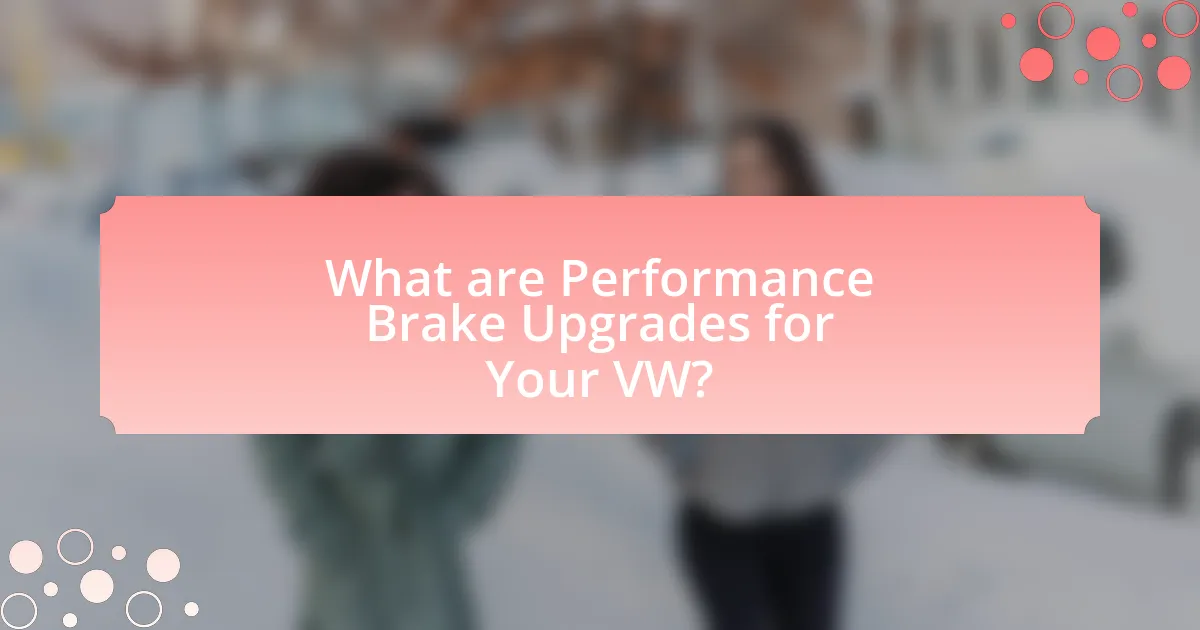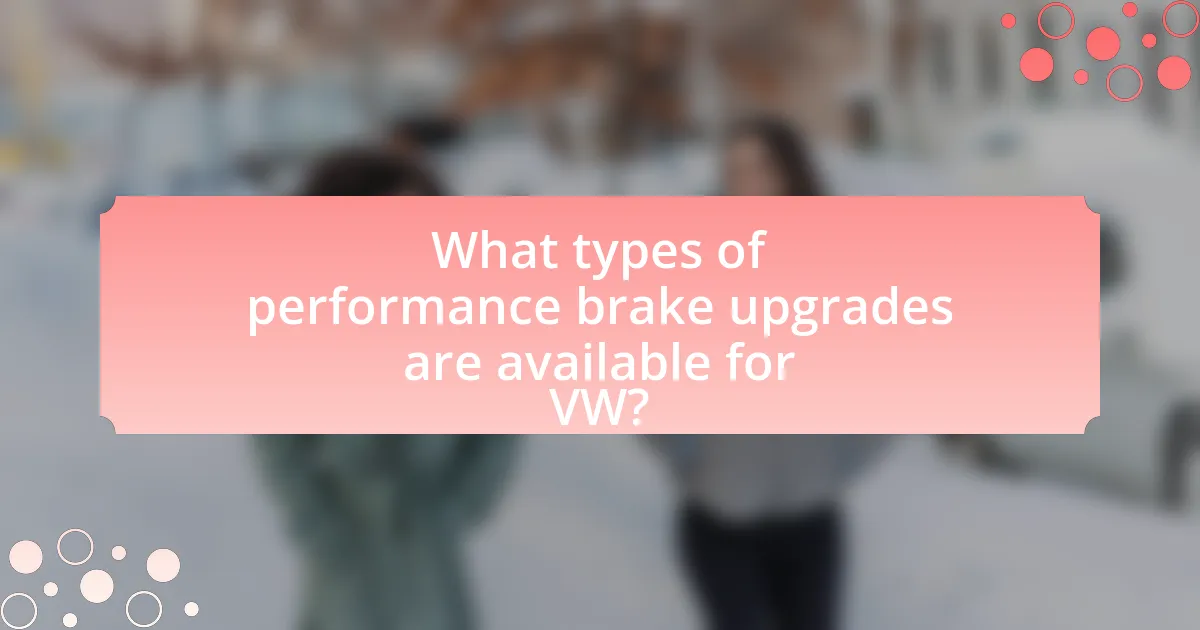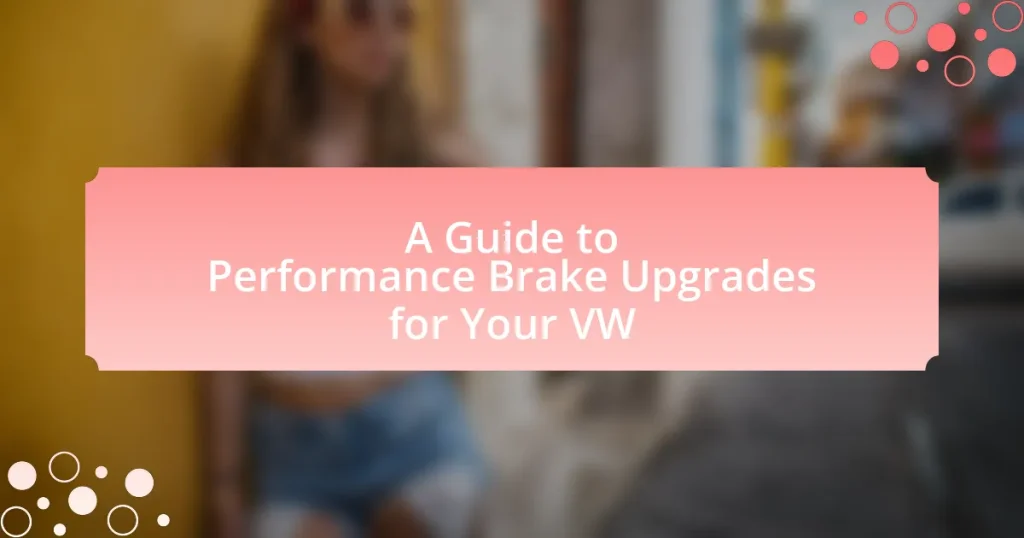Performance brake upgrades for VW vehicles are essential enhancements aimed at improving braking efficiency, reducing stopping distances, and increasing overall safety. Key components of these upgrades include high-performance brake pads, larger rotors, upgraded calipers, and stainless steel brake lines, all designed to withstand higher temperatures and deliver consistent performance under demanding conditions. The article explores the differences between performance and standard brakes, the benefits of various components, and the importance of compatibility with specific VW models. Additionally, it addresses common misconceptions about performance brakes and provides guidance on selecting and installing the right upgrades for optimal safety and performance.

What are Performance Brake Upgrades for Your VW?
Performance brake upgrades for your VW are enhancements designed to improve braking efficiency, reduce stopping distances, and increase overall vehicle safety. These upgrades typically include high-performance brake pads, larger rotors, upgraded calipers, and stainless steel brake lines. For instance, high-performance brake pads offer better heat resistance and improved friction, which can lead to shorter stopping distances compared to standard pads. Larger rotors increase the surface area for heat dissipation, preventing brake fade during intense driving conditions. Upgraded calipers provide better clamping force, enhancing braking power. Stainless steel brake lines improve pedal feel and responsiveness by reducing flex under pressure. Collectively, these components contribute to a more reliable and effective braking system, particularly beneficial for performance-oriented driving or track use.
How do performance brake upgrades differ from standard brakes?
Performance brake upgrades differ from standard brakes primarily in their materials, design, and performance capabilities. Performance brakes typically utilize higher-quality materials such as carbon-ceramic or upgraded metallic compounds, which enhance heat dissipation and reduce brake fade during intense driving conditions. Additionally, performance brake systems often feature larger rotors and calipers, providing increased surface area for better stopping power and improved pedal feel. These upgrades are designed to withstand higher temperatures and deliver consistent performance under demanding conditions, making them suitable for high-performance vehicles or aggressive driving styles.
What components are included in performance brake upgrades?
Performance brake upgrades typically include components such as high-performance brake pads, larger brake rotors, upgraded calipers, stainless steel brake lines, and high-temperature brake fluid. These components work together to enhance braking performance by improving heat dissipation, increasing stopping power, and reducing brake fade. For instance, larger rotors provide a greater surface area for heat dissipation, while high-performance pads are designed to withstand higher temperatures and offer better grip.
Why are performance brake upgrades important for VW vehicles?
Performance brake upgrades are important for VW vehicles because they enhance stopping power, improve heat dissipation, and increase overall safety. Standard brake systems may not provide adequate performance under high-stress conditions, such as aggressive driving or track use. Upgraded components, like larger rotors and high-friction pads, can significantly reduce stopping distances and prevent brake fade, which occurs when brakes overheat. Studies show that performance brakes can improve braking efficiency by up to 30%, making them crucial for maintaining control and safety in various driving scenarios.
What are the key benefits of upgrading your VW’s brakes?
Upgrading your VW’s brakes significantly enhances safety, performance, and driving experience. Improved braking systems provide shorter stopping distances, which is crucial for avoiding accidents. Enhanced brake components, such as larger rotors and high-performance pads, increase heat dissipation, reducing brake fade during intense driving conditions. Additionally, upgraded brakes can improve pedal feel and responsiveness, allowing for better control and precision during braking maneuvers. These benefits contribute to overall vehicle performance, making driving safer and more enjoyable.
How do performance brakes enhance safety and control?
Performance brakes enhance safety and control by providing superior stopping power and improved heat dissipation compared to standard brakes. This increased stopping power reduces the distance required to halt a vehicle, which is crucial in emergency situations, thereby minimizing the risk of accidents. Additionally, performance brakes are designed to maintain consistent performance under high-stress conditions, such as aggressive driving or frequent braking, which helps prevent brake fade. Studies show that vehicles equipped with performance brakes can achieve shorter stopping distances, enhancing overall vehicle control and driver confidence.
What impact do performance brakes have on driving experience?
Performance brakes significantly enhance the driving experience by providing improved stopping power and better heat dissipation. This enhancement allows for shorter braking distances and greater control during high-speed driving or aggressive maneuvers. Studies show that performance brakes can reduce brake fade, which occurs when brakes overheat and lose effectiveness, thereby maintaining consistent performance under demanding conditions. Additionally, the responsiveness of performance brakes contributes to a more engaging and confident driving experience, particularly in performance-oriented vehicles like a VW.

What types of performance brake upgrades are available for VW?
Performance brake upgrades available for VW include high-performance brake pads, upgraded rotors, stainless steel brake lines, and complete brake kits. High-performance brake pads enhance stopping power and reduce fade, while upgraded rotors improve heat dissipation and overall braking efficiency. Stainless steel brake lines provide a firmer pedal feel by minimizing flex, and complete brake kits offer a comprehensive solution that typically includes pads, rotors, and calipers designed for enhanced performance. These upgrades are widely recognized for improving braking performance in various VW models.
What are the differences between brake pads and rotors?
Brake pads and rotors serve distinct functions in a vehicle’s braking system. Brake pads are friction materials that press against the rotors to create the necessary friction for slowing down or stopping the vehicle. In contrast, rotors are metal discs that rotate with the wheels and provide a surface for the brake pads to clamp onto. The effectiveness of brake pads is measured by their material composition and wear characteristics, while rotors are evaluated based on their thickness, heat dissipation, and structural integrity. This differentiation is crucial for understanding brake performance and maintenance in vehicles, including performance upgrades for models like VW.
How do different materials affect brake performance?
Different materials significantly affect brake performance by influencing factors such as friction, heat dissipation, and wear resistance. For instance, ceramic brake pads provide higher friction levels and better heat management compared to organic pads, resulting in improved stopping power and reduced brake fade. Additionally, metallic brake pads, while offering excellent durability and heat resistance, can produce more noise and dust. Research indicates that carbon composite materials enhance braking efficiency and longevity, making them suitable for high-performance applications. Thus, the choice of brake material directly impacts overall braking effectiveness and vehicle safety.
What are the advantages of slotted or drilled rotors?
Slotted or drilled rotors provide enhanced braking performance by improving heat dissipation and reducing brake fade. The slots and holes in these rotors allow for better ventilation, which helps to cool the brake components during heavy use. Additionally, the design facilitates the expulsion of gases and debris that can accumulate between the brake pad and rotor surface, ensuring consistent contact and improved grip. Studies have shown that slotted rotors can increase stopping power by up to 20% compared to standard rotors, making them a popular choice for performance upgrades in vehicles like VW models.
What are the benefits of upgrading to stainless steel brake lines?
Upgrading to stainless steel brake lines enhances braking performance by providing improved pedal feel and responsiveness. Stainless steel lines resist expansion under pressure, which leads to more consistent brake performance compared to rubber lines. Additionally, they offer increased durability and corrosion resistance, ensuring longevity and reliability in various driving conditions. Studies indicate that stainless steel brake lines can reduce brake fade, allowing for better performance during high-stress situations, such as racing or heavy braking.
How do stainless steel lines improve brake feel?
Stainless steel lines improve brake feel by providing enhanced rigidity and reduced expansion under pressure compared to standard rubber hoses. This rigidity allows for more direct and responsive brake pedal feedback, resulting in a firmer and more consistent braking experience. Additionally, stainless steel lines are less prone to swelling, which minimizes the loss of brake fluid pressure and ensures that the braking force is transmitted more effectively from the pedal to the brake calipers. This improvement in brake line performance is supported by the fact that stainless steel has a higher tensile strength than rubber, leading to better performance in high-stress situations, such as aggressive driving or racing.
What maintenance considerations are there for stainless steel lines?
Stainless steel lines require regular inspection for signs of wear, corrosion, and leaks to ensure optimal performance and safety. Maintenance considerations include checking for any physical damage, ensuring proper torque on fittings, and monitoring fluid levels to prevent contamination. Additionally, cleaning the lines with appropriate solvents can help maintain their integrity, as contaminants can lead to corrosion or blockages. Regular maintenance extends the lifespan of stainless steel lines and enhances the overall braking system performance in vehicles.

How can you choose the right performance brake upgrades for your VW?
To choose the right performance brake upgrades for your VW, assess your driving style, vehicle model, and intended use. Performance brake upgrades should match your specific needs, such as daily driving, track use, or off-road conditions. For instance, if you frequently drive on the track, consider high-performance brake pads and rotors designed for heat dissipation and improved stopping power. Additionally, ensure compatibility with your VW’s braking system, as different models may require specific components. Researching reputable brands and reading reviews can provide insights into the effectiveness and reliability of various upgrades.
What factors should you consider when selecting brake upgrades?
When selecting brake upgrades, consider factors such as compatibility with your vehicle, intended use, and performance requirements. Compatibility ensures that the upgraded components fit your VW model and work seamlessly with existing systems. Intended use, whether for daily driving, racing, or off-roading, influences the type of brake materials and designs needed. Performance requirements include factors like stopping power, heat dissipation, and pedal feel, which can vary significantly between different brake systems. For example, high-performance brake pads and rotors are designed to withstand higher temperatures and provide better grip, making them suitable for racing applications.
How does your driving style influence brake upgrade choices?
Your driving style significantly influences brake upgrade choices by determining the type of performance enhancements needed for optimal safety and efficiency. For instance, aggressive driving styles that involve frequent hard braking and high-speed cornering require high-performance brake pads and rotors designed to withstand increased heat and wear. In contrast, a more conservative driving style may prioritize comfort and longevity, leading to choices focused on standard or upgraded components that offer improved durability without the need for extreme performance. Research indicates that drivers who engage in track racing or spirited driving benefit from upgrades such as slotted or drilled rotors, which enhance cooling and reduce brake fade, while everyday drivers may find sufficient performance in OEM replacements.
What is the importance of compatibility with your VW model?
Compatibility with your VW model is crucial for ensuring optimal performance and safety when upgrading brakes. Each VW model has specific design parameters and requirements that dictate the type of brake components that can be used effectively. For instance, using brakes that are not compatible can lead to reduced braking efficiency, increased wear on components, and potential safety hazards. Research indicates that mismatched brake systems can result in longer stopping distances and compromised vehicle handling, which underscores the necessity of selecting parts that are specifically designed for your VW model.
What are common misconceptions about performance brake upgrades?
Common misconceptions about performance brake upgrades include the belief that they are only necessary for racing or high-performance vehicles, that they significantly increase stopping distance, and that they require extensive modifications to the vehicle. In reality, performance brake upgrades can enhance safety and braking efficiency for everyday driving, do not inherently increase stopping distance when properly installed, and often fit within existing brake systems without major alterations. Studies show that upgraded brake pads and rotors can improve heat dissipation and reduce brake fade, leading to better overall performance in various driving conditions.
Do performance brakes wear out faster than standard brakes?
Performance brakes typically wear out faster than standard brakes. This is due to their design, which prioritizes high performance and heat dissipation over longevity. Performance brake pads often use softer materials to enhance grip and stopping power, leading to increased wear rates compared to standard pads that are designed for durability and everyday use. Studies indicate that performance brake systems can experience a reduction in lifespan by 20-30% under similar driving conditions, particularly in high-stress environments like racing or aggressive driving.
Are performance brake upgrades only for racing enthusiasts?
Performance brake upgrades are not exclusively for racing enthusiasts; they can benefit everyday drivers as well. Enhanced braking performance improves safety and control, especially in high-stress driving situations such as heavy traffic or adverse weather conditions. Studies indicate that upgraded brakes can reduce stopping distances significantly, which is crucial for preventing accidents. Therefore, while racing enthusiasts may prioritize performance, the advantages of brake upgrades extend to all drivers seeking improved vehicle safety and handling.
What are some tips for installing performance brake upgrades on your VW?
To install performance brake upgrades on your VW effectively, begin by selecting high-quality components that are compatible with your specific model. Ensure you have the necessary tools, including a jack, jack stands, and a torque wrench, to safely lift the vehicle and secure it during the installation process.
Next, follow the manufacturer’s instructions for the brake kit, as they provide specific guidelines for installation. It’s crucial to clean the brake components thoroughly before installation to remove any debris or grease that could affect performance.
When replacing brake pads and rotors, ensure that you properly bed the new pads according to the manufacturer’s recommendations to optimize braking performance. Additionally, consider upgrading the brake fluid to a higher boiling point fluid to enhance performance under extreme conditions.
Finally, after installation, perform a thorough inspection and test the brakes at low speeds to ensure everything is functioning correctly before driving at higher speeds. These steps will help ensure a successful installation of performance brake upgrades on your VW.
How can you ensure proper installation and safety?
To ensure proper installation and safety of performance brake upgrades for your VW, follow the manufacturer’s guidelines meticulously. This includes using the correct tools, ensuring all components are compatible, and adhering to torque specifications during installation. Additionally, conducting a thorough inspection of the brake system before and after installation, including checking for leaks and ensuring proper alignment, is crucial. Research indicates that improper installation can lead to brake failure, which is a leading cause of accidents; therefore, following these steps significantly reduces risks associated with brake upgrades.
What tools and equipment do you need for the installation process?
For the installation process of performance brake upgrades for your VW, you need a set of specific tools and equipment. Essential tools include a socket set, wrenches, a torque wrench, a brake bleeder kit, and screwdrivers. Additionally, equipment such as a jack and jack stands, a brake caliper tool, and safety goggles are necessary to ensure a safe and effective installation. These tools facilitate the removal and installation of brake components, ensuring proper torque specifications and safe handling of brake fluid.


